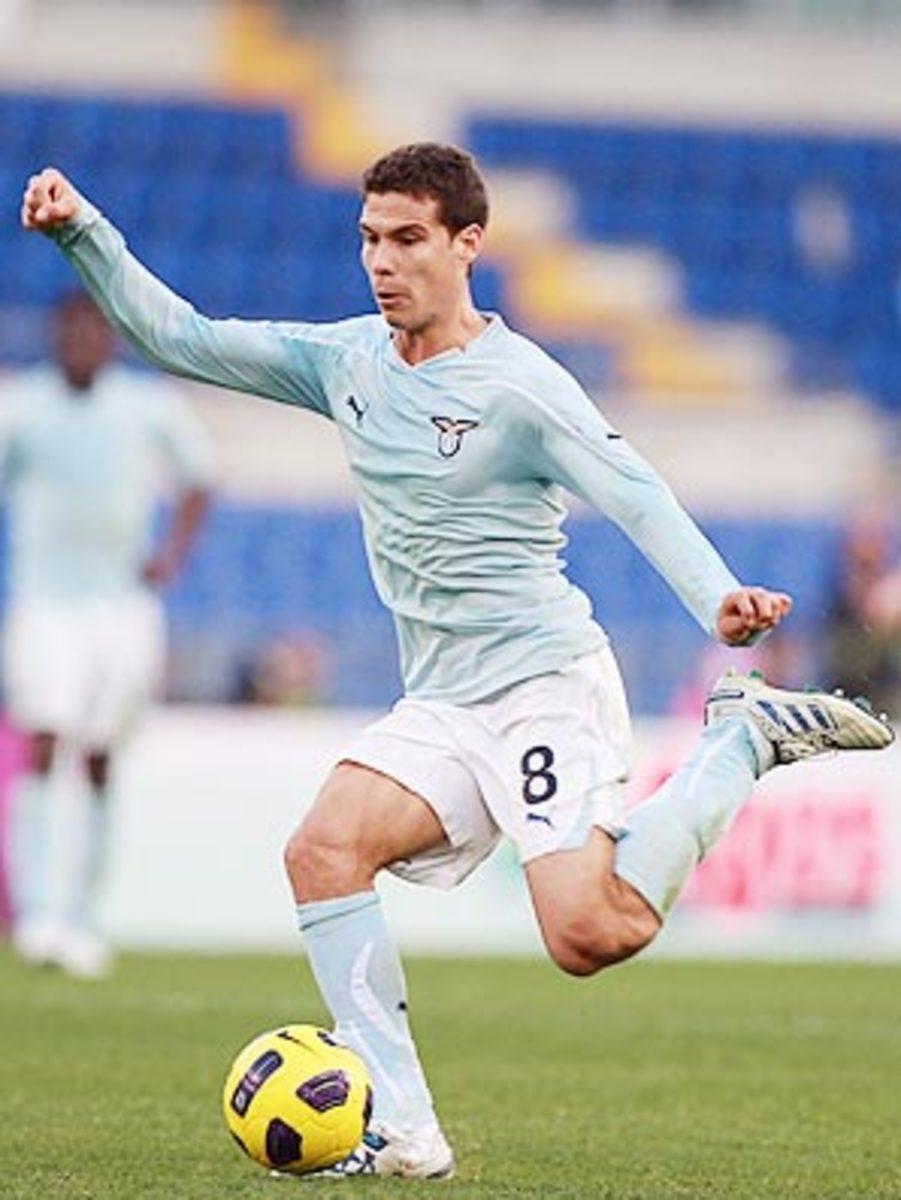
How a prophet, an eagle and Lazarus propelled Lazio to the top
And if Hernanes is "the Prophet," as he's been nicknamed since breaking into the Sao Paulo side four years ago, then Ledesma is "Lazarus," because he (figuratively) rose from the dead. This time last season Ledesma wasn't playing any football. In fact, he hadn't played since May 2009, not because of injury, but because of a contractual dispute. (Ledesma's contract was winding down, and Lazio president Claudio Lotito insisted he sign a new deal. When Ledesma refused, he was punished by being left off the team and made to train on his own. Eventually Ledesma relented and penned a four-year extension, which, at the very least, ensures that if Lotito sells him, Lazio will get something back.)
Lotito is proud of running Lazio on a shoestring (not that he has much of a choice: the club is still paying for the excesses of the Sergio Cragnotti era, which yielded a league title and mountains of debt, which nearly led to bankruptcy), but, when necessary, he has shown a willingness to spend. Hernanes is a case in point. He cost $16.5 million and remains one of the bargains of the summer. The mere fact that Lazio was able to land him is a testament to the power of hard bargaining and realizing that clinching a player's signature is about more than just dangling a big contract and a big transfer fee.
Hernanes' arrival and Ledesma's return left Lazio coach Edy Reja with a dilemma though: who to play? Opting to play both seemed counterintuitive, especially for a guy like Reja who has a safety-first reputation (some suggest the reputation dates back to when, as a teenager, he roomed with one Fabio Capello). But however defensive-minded Reja may be, he's a pragmatist first. And he understands a simple truism of the game: As long as they're willing to work hard, you can cram multiple "skill players" into the lineup without sacrificing defensive solidity. Plus, having guys who can keep the ball is often the best defensive strategy (just look at Barcelona).
Not that Lazio has much else in common with Barca, bar the presence of two intelligent, creative and skillful passing midfielders (and a hard-running ballwinner -- Cristian Brocchi at Lazio, Sergio Busquets at Barca -- to do the dirty work). The resulting midfield for Lazio -- completed by the elegant Stefano Mauri -- can more than hold its own when it comes to maintaining possession, a decisive building block in Reja's tactical approach.
The Ledesma-Hernanes tandem gives Lazio a degree of unpredictability few clubs can match, but the cogs around them have slotted in very well, largely thanks to Reja. Goal scoring has been a team effort -- nobody has more than five, but four players have at least four -- and no club has conceded fewer goals, thanks to a back four brilliantly marshaled by veteran Andre Dias (Hernanes' former teammate at Sao Paulo who arrived under the radar and has impressed everyone). While goalkeeper Nestor Muslera often looks like Bambi caught in headlights, he's been far more effective than he appears, riding his solid World Cup form into the first half of the season. Up front, long-time talisman Tommaso Rocchi has seen his minutes cut dramatically, but has accepted a reduced role without causing a fuss. In his place, Mauro Zarate (who hasn't hit the heights of two years ago but, at 23, has plenty of time to turn it around) and newly arrived Sergio Floccari have carried the load.
The more superstitious among Lazio fans also point to a key summer newcomer: Olimpia, a bald eagle "signed" from Benfica. The Portuguese club has long released an eagle to fly around the Estadio do Luz as part of its pregame ritual, and Lazio decided to follow suit. Since she's arrived, Olimpia has been a hit.
But solid signings aside, it's not lost on anyone that the biancocelesti have also had a fair dose of luck this season. Witness last weekend, when Lazio soaked up Sampdoria's pressure for most of the game and then found the winner through Libor Kozak, in the dying minutes, entirely against the run of play.
"You never know when good fortune comes, maybe we have been lucky, but it's also about being ready and in a position to take advantage of luck when you do get lucky," Reja said last week.
He has a point. All season long most of Italy has waited for Lazio to fall apart. They're still waiting. The club moved into second place back in October and hasn't looked back since.
The temptation is to write off Lazio. Hernanes has been playing virtually non-stop for the past twelve months, and at some point he's bound to take a breather. The unheralded defense, at some point, has to crumble. And the Floccari-Zarate partnership pales in comparison to those of the teams around Lazio in the table: Napoli has Edinson Cavani and Ezequiel Lavezzi; Milan Zlatan Ibrahimovic and Robinho (not to mention Pato and Antonio Cassano); Inter has Samuel Eto'o and Diego Milito; and Roma has Marco Borriello, Francesco Totti and Mirko Vucinic.
Yet Lazio -- fueled by Olimpia, Lazarus and the Prophet -- continues to fly high. And Reja, hardly the most effusive character, can smile to himself: he had a far better 2010 than his old buddy Capello.




